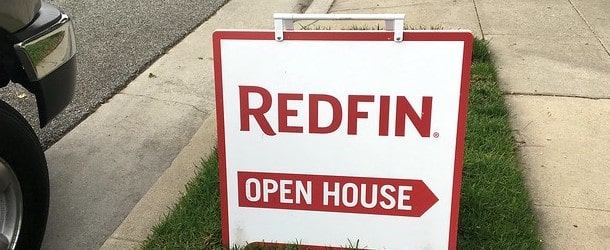Aside from tracking mud through your beautiful home, it turns out open houses actually lead to higher sales prices and less time on market, per a new analysis from Redfin.
The real estate brokerage, which studied 2018 for-sale listings, noted that properties featuring an open house sold for $9,046 more on average and spent seven less days sitting on the market.
They discovered this by looking at sale-to-list price ratios and time on market of homes that held an open house within their first week on the market versus those that never had one.
There’s certainly a lot of controversy regarding open houses, with some critics saying they do more for the listing agent than the homeowner (in the way of new leads for the agent).
But they’re also pretty customary in many regions of the country, with some home sellers probably assuming they’re obligatory.
However, it turns out they’re fairly rare in some parts of the U.S.
In fact, just 24% of 2018 for-sale listings held an open house in the first week, which seems lower than you’d expect.
They also aren’t held if the property is unique (think a multi-million-dollar mansion owned by someone famous who only wants serious buyers snooping around).
Will Your Home Sell for More If You Hold an Open House?
- Homes sold for more in nearly all metros studied by Redfin
- When an open house took place in the first week of listing
- This was also the case in places where open houses are rare
- Meaning it tends to add value regardless of whether they’re common practice or not
As noted, Redfin wanted to determine if listings with open houses sold for more than their non-open house counterparts.
After all, why waste time letting a bunch of lookie-loos into your home if they aren’t going to buy the place?
To determine this, they analyzed 2018 for-sale listings that featured an open house within one week of going to market.
Additionally, they only included open houses held on Friday, Saturday, or Sunday, and the homes must have sold within six months of listing.
As you might expect, foot traffic is higher during the weekend, which means more prospective home buyers entered these homes on Saturday and Sunday.
While open houses do take place during the week, they are much more common on the weekend for obvious reasons (people don’t need to skip work, fight traffic, etc.).
Anyway, they found that in all the major metros they analyzed (save for Baltimore -0.4%), homes sold for more if an open house occurred in week one.
This was the case even in places where open houses aren’t customary, such as in Detroit and Las Vegas.
In San Francisco, homes sold for 7.9% more relative to their list price, which can be a huge chunk of change considering how expensive properties are in the Bay Area. The same was true in San Jose, with homes fetching 5.2% more.
Over in Raleigh, NC, homes sold for 4.6% more, which equated to another $13,000 on the median $286,000 home, perhaps enough to cover a good amount of the closing costs and real estate agent commissions.
Redfin also discovered that homes sold faster, spending 24 days on the market versus 31 days for properties without an open house in the first week nationwide.
However, this wasn’t the case in all metros. For example, in San Francisco homes actually sold seven days slower if they had an open house the first week.
But this is apparently related to a common practice of holding two weekends of open houses before taking in offers.
The same went for Newark, New Jersey, where homes with an open house in week one sold a lot slower, 61 days on market versus 38.
The caveat is open houses are also incredibly rare there, with just 4% of homes holding one in the first week. This might mean the properties needed some extra attention, any attention, to sell.
While open houses can be an effective tool for any house, they might be called in as an additional measure in a throw the kitchen sink at it type of way.
If the listing agent knows the property is unique (perhaps not in a good way), they might recommend an open house to get more would-be buyers in the door.
This counters those sight-unseen sales where a home can sell without the buyer even stepping foot inside.
In most metros nationwide, homes did tend to sell quicker and for more, even in cities where open houses aren’t at all common.
Where Open Houses Are Most Common (During Week 1)
San Francisco – 84% of listings (+7.9% sales price)
San Jose – 84% (+5.2%)
Boston – 75% (+1.8%)
Seattle – 70% (+1.9%)
Honolulu – 56% (+1.4%)
Los Angeles – 52% (+1.7%)
Portland – 44% (+1%)
Washington D.C. – 38% (0.6%)
San Diego – 35% (0.9%)
St. Louis – 31% (+1.4%)
Where Open Houses Are Least Common (During Week 1)
Newark – 4% of listings (+0.1% sales price)
Miami – 5% (+1.2%)
Detroit – 8% (+2.1%)
Las Vegas – 9% (+0.1%)
New Orleans – 9% (+1.4%)
Atlanta – 12% (+0.9%)
Tampa – 14% (+0.6%)
Charlotte – 16% (+0.8%)
Omaha – 17% (+0.3%)
Philadelphia – 17% (+1.4%)
As you can see, whether open houses were commonplace or not, properties often sold for more, albeit just a little bit more in certain places, when an open house occurred during the first week.
So if you’re looking to squeeze a little more out of your listing, it might make sense to hold an open house. Just be sure to hide the valuables and make plans to be elsewhere.
Read more: 12 home selling tips for 2019

